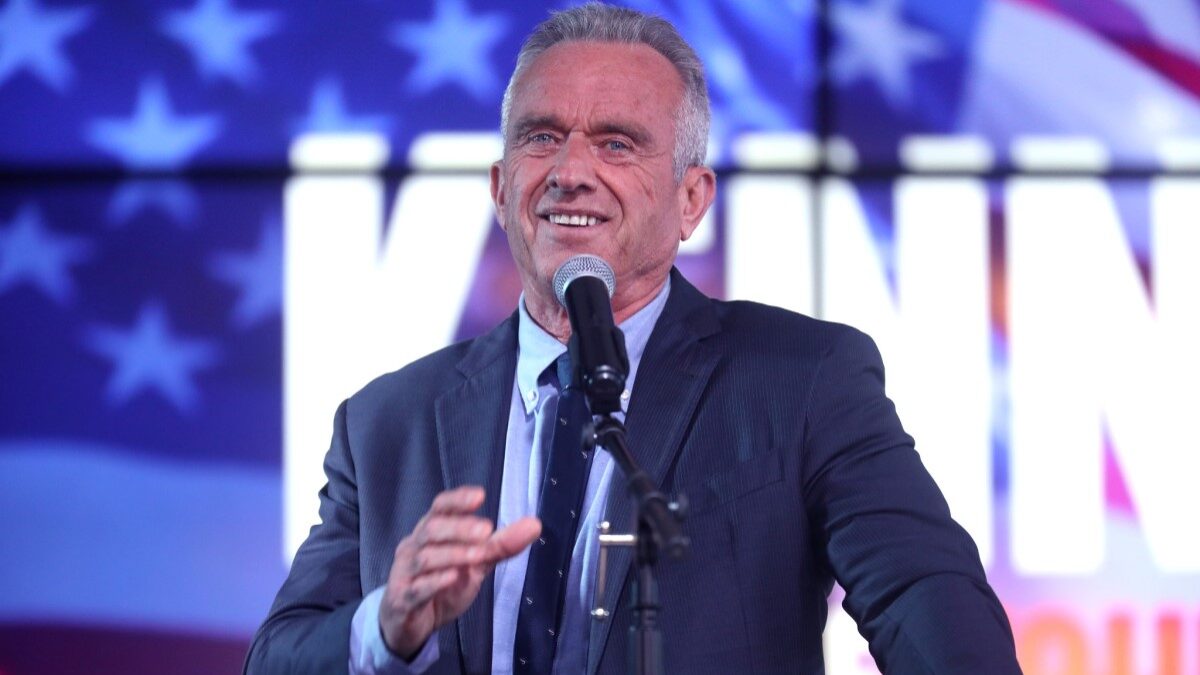 |
| Gage Skidmore / Flickr/CC by 2.0 |
We must return to evidence-based medicine, remove conflicts of interests, and promote open scientific discourse without censoring or slander.
Some in the scientific community are shocked and dismayed. President-elect Donald Trump has nominated Robert F. Kennedy Jr. to lead the Department of Health and Human Services, which includes the Centers for Disease Control, National Institutes of Health, Food and Drug Administration, and other federal health agencies. Are their concerns warranted? Or, are they hypocritical?
Kennedy’s three stated goals for the federal health agencies are (i) evidence-based medicine, (ii) clean up corruption and conflicts of interest, and (iii) end the chronic disease epidemic, with special emphasis on our children and concrete results within two years. These are not only laudable goals, but urgent ones.
During the Covid pandemic, evidence-based medicine and the fundamental principles of public health were thrown out the window. With the health agencies’ singular focus on Covid, school closures and other lockdown measures generated enormous collateral damage that is increasingly obvious. The exception was Sweden, which had the lowest excess mortality during the outbreak.
Federal agencies questioned and ignored 2,500 years of scientific knowledge about immunity when they enforced vaccine mandates on students and working-age adults with superior infection-acquired immunity while my 87-year-old neighbor and other older people around the world were still unvaccinated. Covid vaccines saved the lives of many older people, but Covid vaccine mandates killed older people by directing vaccines to those not needing them. That was both unscientific and unethical.
It is noteworthy that many who abandoned evidence-based medicine during the pandemic are now criticizing Kennedy, who wants the CDC, NIH, and FDA to return to evidence-based medicine.
Scientists are tasked with both developing and evaluating drugs and vaccines, and it is important to separate these two important roles. Scientists evaluating drug and vaccine safety should not take money from pharmaceutical companies. --->READ MORE HEREDid the Battle Against ‘Misinformation’ Go Too Far?
The pandemic brought a massive effort to limit the spread of bad health information. Did it do more harm than good?
The pandemic brought a massive effort to limit the spread of bad health information. Did it do more harm than good?
In March 2021, a Twitter user asked Martin Kulldorff if everyone needed to be vaccinated against Covid-19. Kulldorff, then a professor at Harvard Medical School, had spent 20 years researching infectious diseases and contributing to the development of the country’s vaccine safety surveillance system.
“No,” he responded. The vaccines were important for some high-risk people, he wrote, but “those with prior natural infection do not need it. Nor children.”
That advice put Kulldorf outside the mainstream in his field, and he soon faced consequences from Twitter (now known as X). The social network labeled the tweet as misleading and inserted a link offering users an opportunity “to learn why health officials recommend a vaccine for most people.” Twitter also limited the post’s ability to be retweeted and liked, Kulldorff said in a recent interview.
The experience spooked him. His account had already been suspended once, he said, and he didn’t want to risk a permanent ban. “I had to self-censor,” said Kulldorff. “I didn’t say everything I would have liked to say.”
He was far from alone. Over the course of the pandemic, major social media companies removed thousands of accounts and millions of posts that contained statements about Covid-19 flagged as false or misleading. These measures were part of an unprecedented pandemic-era effort to limit the spread of health misinformation at a time when the internet was awash with dubious claims of miracle cures, illness-inducing 5G networks, and vaccines that harbor microchips.
The question that some public health experts are now asking is whether those efforts ultimately made users healthier and safer. Some studies do suggest that exposure to health misinformation can have real-life consequences, including making some people less likely to want to get a Covid-19 vaccine. And several public health experts told Undark that it is perfectly reasonable for tech companies to remove or deemphasize patently false health claims.
But there’s scant evidence those policies actually boosted vaccination rates or prevented harmful behaviors. Indeed, early studies analyzing vaccine misinformation policies specifically have found that such policies did little to reduce users’ overall engagement with anti-vaccine content. In addition, some public health researchers are concerned that posts from people like Kulldorff — an expert with informed-but-heterodox views — were caught up in a dragnet that stifled legitimate debate at a time when the science was still unsettled.
These and other incidents of content moderation are now part of a sprawling First Amendment lawsuit alleging that numerous federal agencies coerced social media companies into removing disfavored content from their platforms. Kulldorf is one of several plaintiffs. --->READ MORE HEREFollow links below to relevant/related stories and resources:
WWE NXT's Arianna Grace Recalls Her Training Getting Derailed By COVID-19 Pandemic
Americans spend less time outside home post-COVID-19, UCLA study reveals
USA TODAY: Coronavirus Updates
WSJ: Coronavirus Live Updates
YAHOO NEWS: Coronavirus Live Updates
NEW YORK POST: Coronavirus The Latest
If you like what you see, please "Like" and/or Follow us on FACEBOOK here, GETTR here, and TWITTER here.


No comments:
Post a Comment